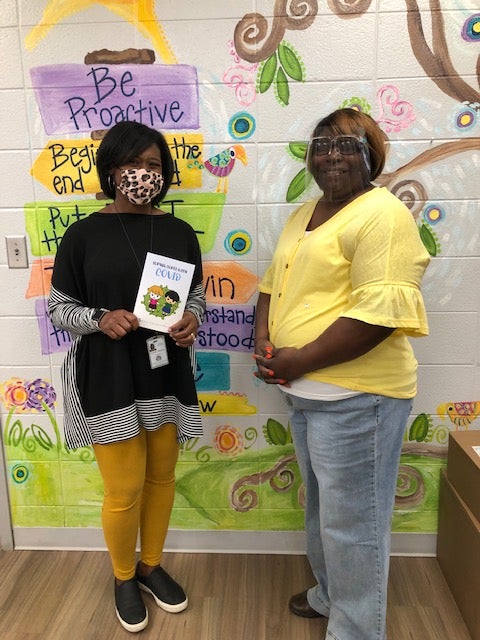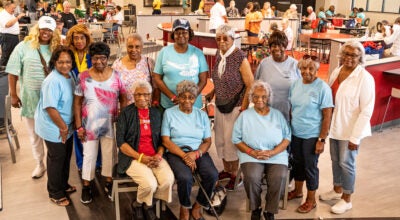Mental health professionals tackle pandemic-related stress
Published 9:59 am Friday, March 19, 2021

- Mental health can be an overlooked aspect of the COVID-19 pandemic. Central Alabama Wellness is trying to spread awareness and help people, especially children, deal with the resulting stress. (Contributed)
|
Getting your Trinity Audio player ready...
|
By SCOTT MIMS / Staff Writer
Our everyday lives involve a certain amount of stress—and the source of that stress, levels of severity and strategies for overcoming it all vary from person to person. But a year ago, when the COVID-19 pandemic hit the United States, everyone was forced to throw out the proverbial playbook and start over from scratch.
While we rightfully recognize all of the frontline workers in the medical field who help to test for COVID-19, treat our loved ones and put themselves at risk every day, there is another side to this pandemic and how it affects each and every person that cannot be ignored—the mental health aspect.
That’s where people like Zina Cartwell of Central Alabama Wellness come in. An important part of Cartwell’s job is to identify those who are most at risk of mental health issues brought on by the pandemic, and to help them deal with pandemic-related stress.

Zina Cartwell of Central Alabama Wellness (right) is pictured with Elvin Hill Elementary Principal Courtney Madison. (Contributed)
Cartwell said that three major groups—children, the elderly, and those already predisposed to mental health issues—are most at risk.
“Even though children are very resilient, the whole world was turned upside down with school, with interaction with peers. A lot of students need face-to-face interaction,” said Cartwell, prevention director with Central Alabama Wellness. “Feeling safe and feeling connected to other people—those are the things that help build esteem. We need that.”
When it comes to students, the danger often lies in not knowing how to deal with difficult emotions brought about by unexpected change. If left untreated, this can lead to destructive behavior like substance abuse.
For certain students, school is their safe haven if they find themselves in a home environment that is unsafe or lacking in important resources—primarily food.
“Sometimes the safest place they can be is the school,” Cartwell said. “That was the first thing that came to my mind—students who are having to stay at home and are already having to deal with the stress of home.”
For those in the elderly population, increased isolation is a primary concern—along with the fear of catching COVID-19 on top of dealing with existing medical issues.
Obviously, the pandemic created a bigger gulf of separation between the elderly and caregivers. With all senior centers closed, suddenly many more seniors became virtually homebound, relying heavily on programs such as Meals on Wheels.
“Having to be in isolation, a lot of times that group is kind of looked over (when it comes to) mental health,” Cartwell said. “Isolation, going to the doctor, dealing with illness and being disconnected from those who need to work with them.”
The same goes for mental health patients who had been seeing a doctor or attending regular treatment sessions prior to the pandemic, and all in-person visits were suddenly brought to a halt. Suddenly, everything went from being in person to over the phone.
Cartwell admitted the separation aspect is difficult, even from a professional standpoint. Being in the counseling field, she is used to working in the community.
“It was hard,” she said, recalling the first few months during the economic shutdown when she was forced to work from home. “I feel like we’re in a state of recovery. It hit us so hard we’re trying to recover from the decisions that we made or how the COVID-19 pandemic affected us mentally.”
On the flipside, as COVID-19 trends toward what people hope will be some version of normalcy, many are dealing with the stress of re-entering normal society.
Cartwell said it is important for individuals to recognize how they feel and not hesitate to reach out to someone if they are not in a good place.
“Knowing that anytime we have something that happens unexpectedly, it can bring us to a place of unbalance, so the most important thing is finding that balance of wellness,” she said. “I think that’s one thing the pandemic has taught us, to pay closer attention to ourselves and our families.”
Through resources made possible by the Alabama Apart Together Grant, Central Alabama Wellness has created literature to help those struggling with pandemic-related anxiety. Alabama Apart Together was created by the Alabama Department of Mental Health and the Alabama Emergency Management Agency through funding from FEMA and Substance Abuse and Mental Health Services.
Central Alabama Wellness is distributing a children’s book among students from kindergarten through fourth grade. “Sophia copes with COVID” tells the story of a child, Sophia, her best friend Carlos, their families and classmates as they learn to deal with a new way of life caused by the pandemic.
The book is being distributed to schools in Shelby and Chilton counties through events held on school campuses.
“It gives children an explanation of what’s going on and helps them deal with their feelings,” Cartwell said. “I think the more information we give someone, the more understanding they will have as to how to deal with it. It really is about teaching how to deal with stress at a very young age and walking someone through that process, and the pandemic is a platform for that.”
She said principals have been appreciative of the resource.
Courtney Madison, principal of Elvin Hill Elementary in Columbiana, said her students have shown great resilience in coping with and adjusting to changes.
“Although the year has presented my uncertainties, our goal for this school year was to maintain some sense of normalcy for our students in regards to meeting their needs emotionally, socially and academically,” Madison said.
Genét Holcomb, principal at Calera Elementary, said her school had focused on social and emotional wellness prior to the pandemic.
“We want students to be self-aware and recognize their emotions and then utilize strategies for expressing and coping with those emotions,” Holcomb said. “Having a predictable routine and environment provides safety. So, at Calera Elementary, we spend a lot of time teaching these routines and procedures and work diligently to keep those in place. As changes occur, communicating the changes prior helps with adjustments. I can’t say enough about the resiliency of our students and the innovations of our teachers and staff.”
Other resources CAW provides include individual counseling sessions, public education, and other literature aimed at different groups in the community.
For more information, contact CAW at 205-651-0077 or contact Alabama Apart Together at 1-888-442-1793. Cartwell may be reached at Zcartwell@centralalabamawellness.org.









